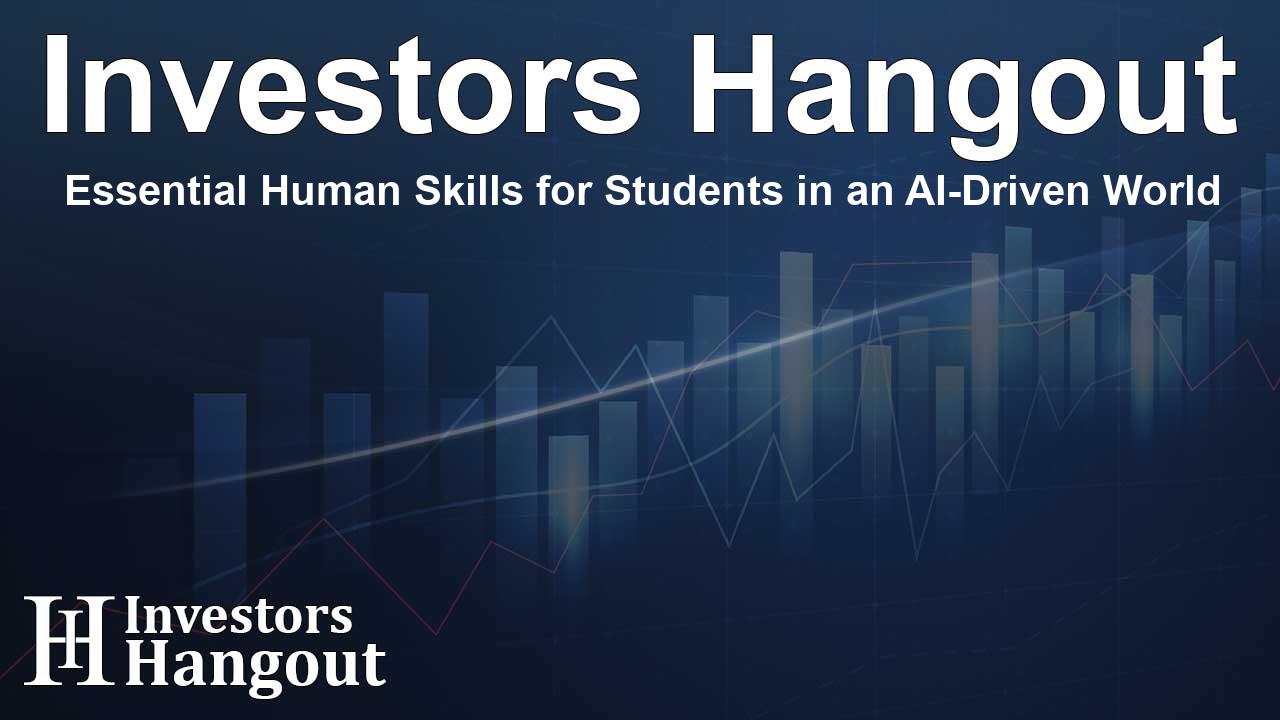Essential Human Skills for Students in an AI-Driven World

Essential Skills for Students Facing an AI Future
The landscape of career opportunities is rapidly evolving, particularly with the rise of artificial intelligence. In response, a recent report by Acuity Insights emphasizes the need for human skills in students and future graduates. This report outlines the skills necessary for thriving in an AI-dominated job market, advocating for higher education institutions to prioritize these attributes.
The Shift from Technical to Durable Skills
Traditionally, technical skills have been considered the cornerstone of career success. However, Acuity Insights highlights a significant shift—over time, success will increasingly depend on what are known as durable skills, often referred to as soft skills. This includes abilities such as empathy, resilience, collaboration, and ethical reasoning. In an era where AI can handle many technical tasks, these human traits become paramount.
Key Findings from the Latest Report
The findings derived from comprehensive academic and market analyses provide a clear lens through which we can view the future of career preparation:
- 75% of long-term job success is attributed to professional skills rather than technical expertise.
- More than 25% of executives express reluctance to hire recent graduates due to a deficiency in durable skills.
- The impact of COVID-19 has affected the development of professional skills, leaving many students ill-prepared for collaboration and professional environments.
- The report identifies eight essential durable skills—notably empathy, problem-solving, and self-awareness—that must be actively nurtured for students to excel in the workplace.
Voices from Industry Leaders
According to Matt Holland, CEO of Acuity Insights, "While technical skills may initially open doors, it is the enduring human skills that foster long-term success in careers." He stresses the importance of embedding these skills into the educational framework, suggesting that higher education must innovate and adapt its teaching methods to meet the future demands of the workforce.
Practical Strategies for Institutions
The report shares several pragmatic approaches for educational institutions aiming to enhance professional skills development:
- Incorporate assessments of non-academic skills at admission stages, utilizing tools like Situational Judgment Tests (SJTs).
- Integrate professional skills training throughout all areas of the curriculum to ensure a holistic educational experience.
- Establish partnerships that connect technical training with essential interpersonal skills and ethical reasoning.
The Role of the Casper Assessment
One tool gaining traction in this area is the Casper assessment. This open-response SJT focuses on measuring candidates' social intelligence and professionalism. Supported by two decades of research, it offers a structured approach to examining the interpersonal skills vital for success in various fields.
Casper challenges applicants with real-life scenarios, encouraging them to respond in ways that showcase their ability to navigate complex, professional situations with maturity and insight.
Core Skills Measured by Casper
The Casper test evaluates several skills critical for future workplace success, including:
- Communication
- Collaboration
- Empathy
- Fairness
- Teamwork
Impact on Future Career Paths
This assessment is not just theoretical; it's being used by educational partners worldwide across several fields, including medicine, health sciences, teaching, business, and engineering. This wide application demonstrates the significant impact Casper can have on shaping incoming talent ready to meet the challenges of the 21st century.
Conclusion
In summary, the Acuity Insights report paints a clear picture: as we advance further into an age defined by artificial intelligence, the need for durable, human-centered skills becomes more critical. Educators, employers, and students must collaborate to foster these skills, ensuring that future generations are equipped for lasting success.
Frequently Asked Questions
What are durable skills?
Durable skills, also known as soft skills, are traits such as empathy, collaboration, and problem-solving that enhance workplace success.
Why are human skills important in an AI-driven world?
As AI automates technical tasks, human skills like empathy and resilience become vital for career advancement and job fulfillment.
What does the Casper assessment measure?
Casper evaluates interpersonal skills, professionalism, and social intelligence through scenarios that candidates respond to.
How can educational institutions improve skills training?
Institutions can embed professional skills development in their curricula and use assessments like SJTs for admissions.
Who benefits from using Casper?
Students applying to diverse fields, including medicine and business, benefit from the skills measured by the Casper assessment.
About The Author
Contact Dominic Sanders privately here. Or send an email with ATTN: Dominic Sanders as the subject to contact@investorshangout.com.
About Investors Hangout
Investors Hangout is a leading online stock forum for financial discussion and learning, offering a wide range of free tools and resources. It draws in traders of all levels, who exchange market knowledge, investigate trading tactics, and keep an eye on industry developments in real time. Featuring financial articles, stock message boards, quotes, charts, company profiles, and live news updates. Through cooperative learning and a wealth of informational resources, it helps users from novices creating their first portfolios to experts honing their techniques. Join Investors Hangout today: https://investorshangout.com/
The content of this article is based on factual, publicly available information and does not represent legal, financial, or investment advice. Investors Hangout does not offer financial advice, and the author is not a licensed financial advisor. Consult a qualified advisor before making any financial or investment decisions based on this article. This article should not be considered advice to purchase, sell, or hold any securities or other investments. If any of the material provided here is inaccurate, please contact us for corrections.
